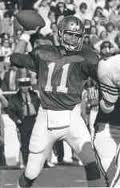
*THE LEGACY OF A DAD’S LIFE
“TELL ME WHO YOUR FATHER IS AND I’LL TELL YOU WHO YOU ARE”
Every father leaves a legacy with his children—no exceptions. The only question is, what kind of legacy?
A few years ago, a team of New York state sociologists attempted to calculate the influence of a father’s life on his children and the following generations. In this study, they researched two men who lived in the 18th century. One was Max Jukes, the other Jonathan Edwards. The legacy that each of these men left their descendants stands as a study in contrasts; they are as different as night and day.
Max Jukes was an unbeliever, a man with no principles. His wife also lived and died in unbelief. What kind of a lasting influence did he leave his family? Among the 1,200 known descendants of Max Jukes were:
- 440 lives of outright debauchery (excessive indulgence in sensual pleasures)
- 310 paupers and vagrants
- 190 public prostitutes
- 130 convicted criminals
- 100 alcoholics
- 60 habitual thieves
- 55 victims of impurity
- 7 murderers
Research shows that not one of Jukes’ descendants made a significant contribution to society—not one! To the contrary, this notorious family collectively cost the state of New York $1,200,000.00.
Not much of a legacy.
What about the family of Jonathan Edwards? Regarded as the most brilliant mind America has ever produced, Edwards was a noted pastor and astute theologian. This renowned scholar was the instrument God used to bring about the Great Awakening in colonial America. Later, he served as the president of Princeton College.
Jonathan Edwards came from a godly heritage and married Sarah, a women of great faith. Together, they sought to leave an entirely different legacy. Among his male descendants were:
- 300 pastors, missionaries , or theological professors
- 120 college professors
- 110 lawyers
- 60 physicians
- 60 authors of good books
- 30 judges
- 14 presidents of universities
- numerous giants in American industry
- 3 U.S. congressmen
- 1 vice-president of the United States
There is scarcely any great American industry that has not had one of Jonathan Edwards descendants as its chief promoter. Such is the lasting influence of a godly man.
Now that’s a legacy!
Every man leaves a lasting influence on his children that will affect future generations for centuries to come. But let’s face it, not all legacies are the same. Some are productive, others destructive. Some are illustrious, others are infamous. How you live your life will affect generations to come. The only question is, what kind of a legacy will you leave behind?
THIS IS YOUR LIFE
To help you answer that question, I want you to imagine that you have just walked into a church to attend a funeral service. The mood is somber, the crowd quiet. Loved ones are making there way past the open casket for the final viewing of the body. Many are weeping. Some are wiping their eyes with handkerchiefs. A few stand gazing at the lifeless body.
The specific time has now come for the service to begin. As the minister approaches the pulpit, he motions for the congregation to rise. The family of the deceased slowly proceeds down the center aisle to the front.
Anxiously, you look up to identify the family. As you peer into the face of each member, you are in for the shock of your life. Suddenly, you realize this is your family!
You are attending…your funeral!
In stunned disbelief, you respond to the minister’s directions for the congregation to be seated. He begins by expressing his feelings of appreciation for your life. What he says is nice and flattering. But at the same time, his words are generic and impersonal.
Let’s be honest, it’s the words of your family, those closest to you that matter most. What will your wife say about you? What will your children say about you?
The minister finishes his eulogy and motions to your children to come to the pulpit. They approach the platform, waiting their turn to speak about how you influenced their lives. One by one, your kids reflect on their years with you and share remembrances of you as their dad. They recall incidents you have long forgotten. They remember your impact, reflect on your character, and recite your virtues.
At this point, all you can do is listen. With riveted attention, you hang on their every word. These are the most important sentences you will ever hear anyone speak about you. Your lasting success as a dad is measured by what they say.
All imagination aside, if you died today, what would your children remember you for? What would be your legacy to them?
What your children take from your life, in large measure, will define your legacy as a dad. Your lasting influence upon their lives will mark whether or not you lived successfully as a dad. This will be your legacy.
*Adapted from the book The Legacy: What Every Father Wants To Leave His Child by Steven J. Lawson, pp. 13-15










